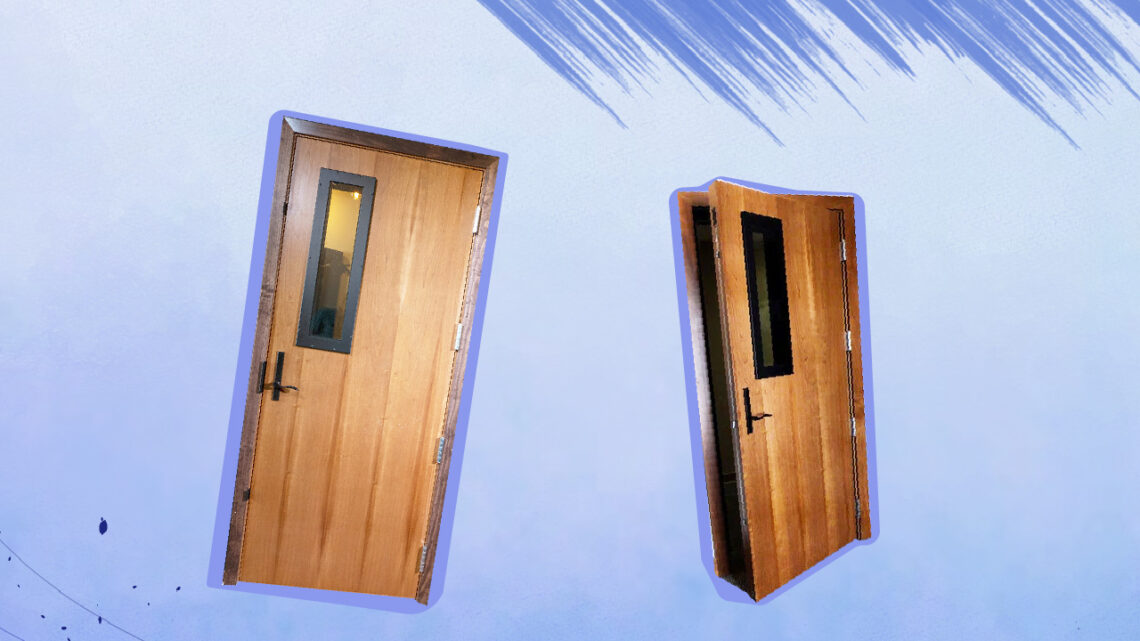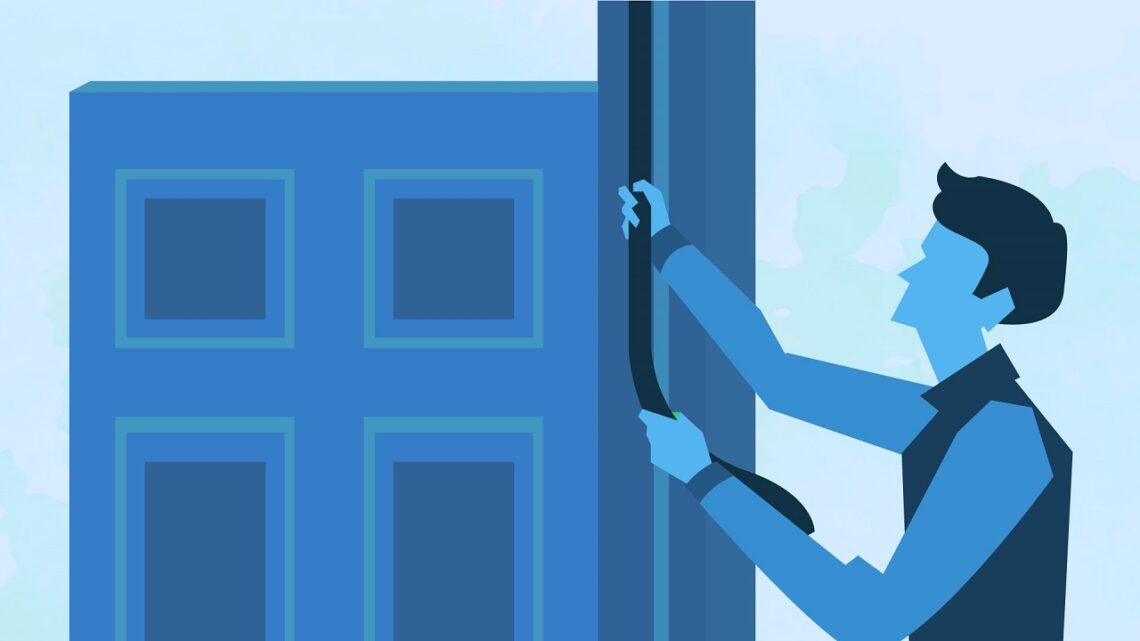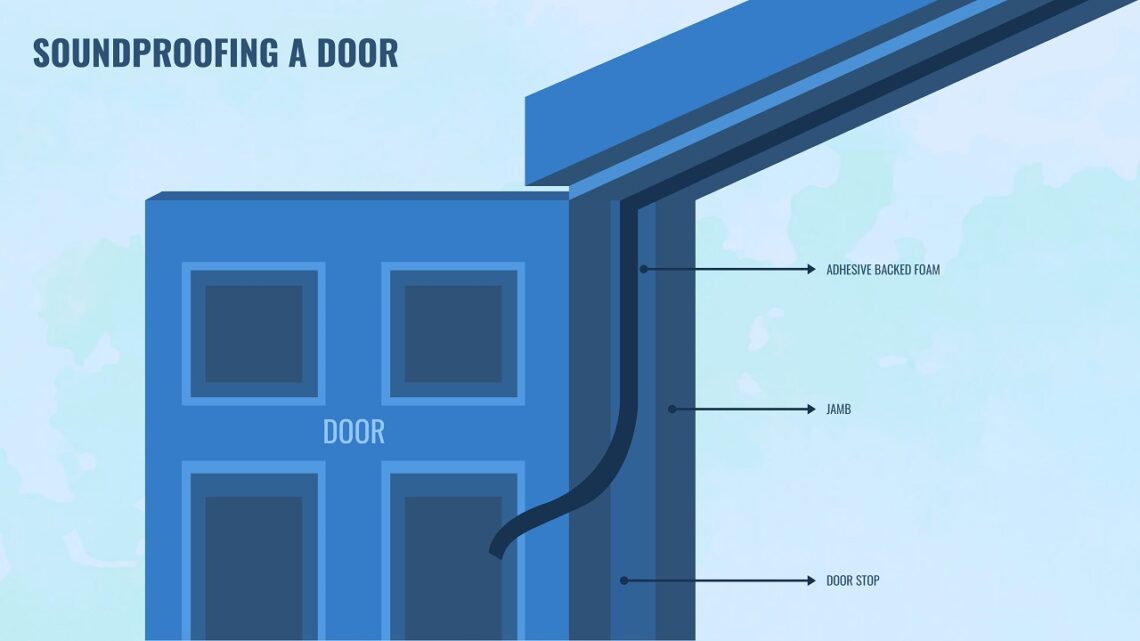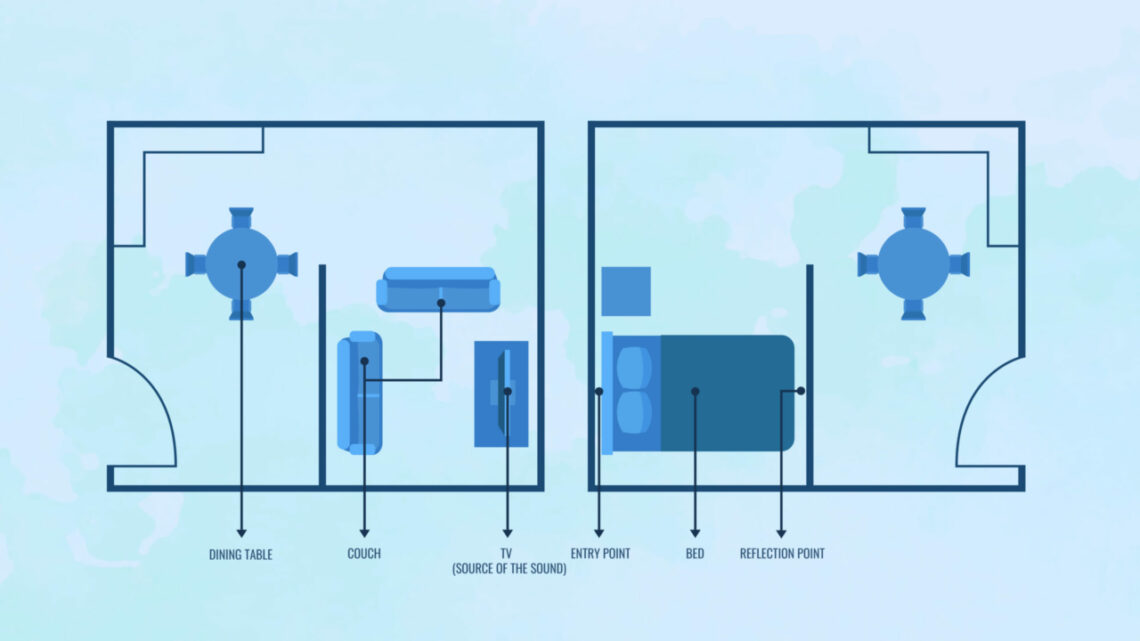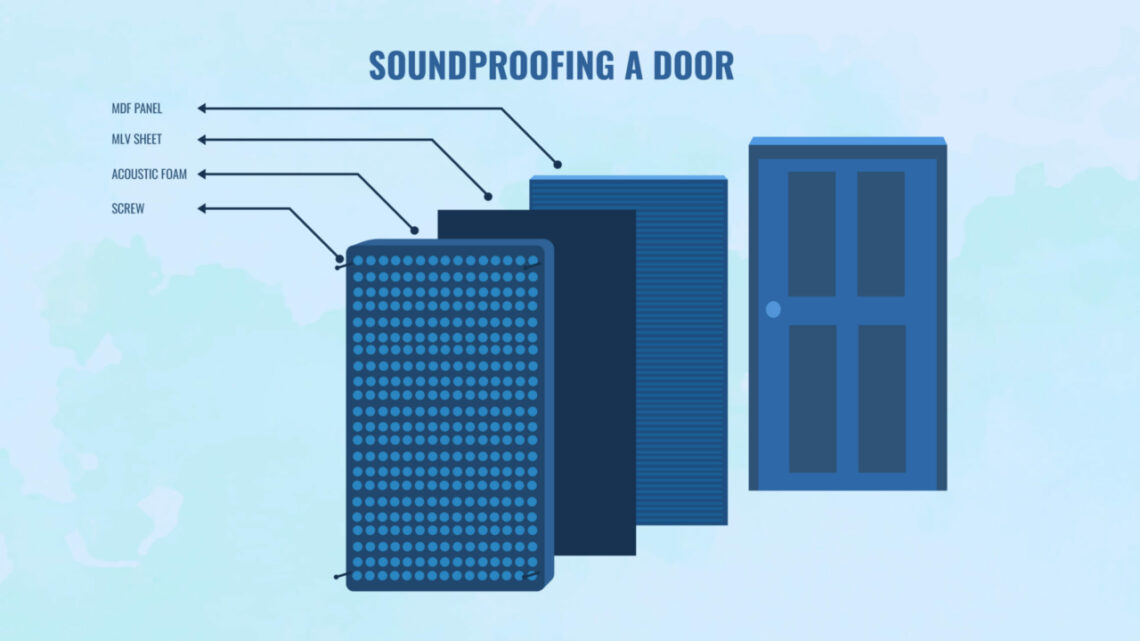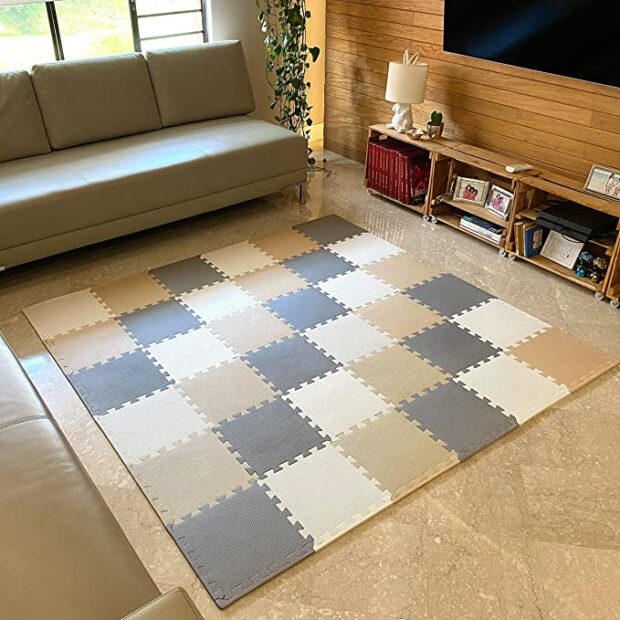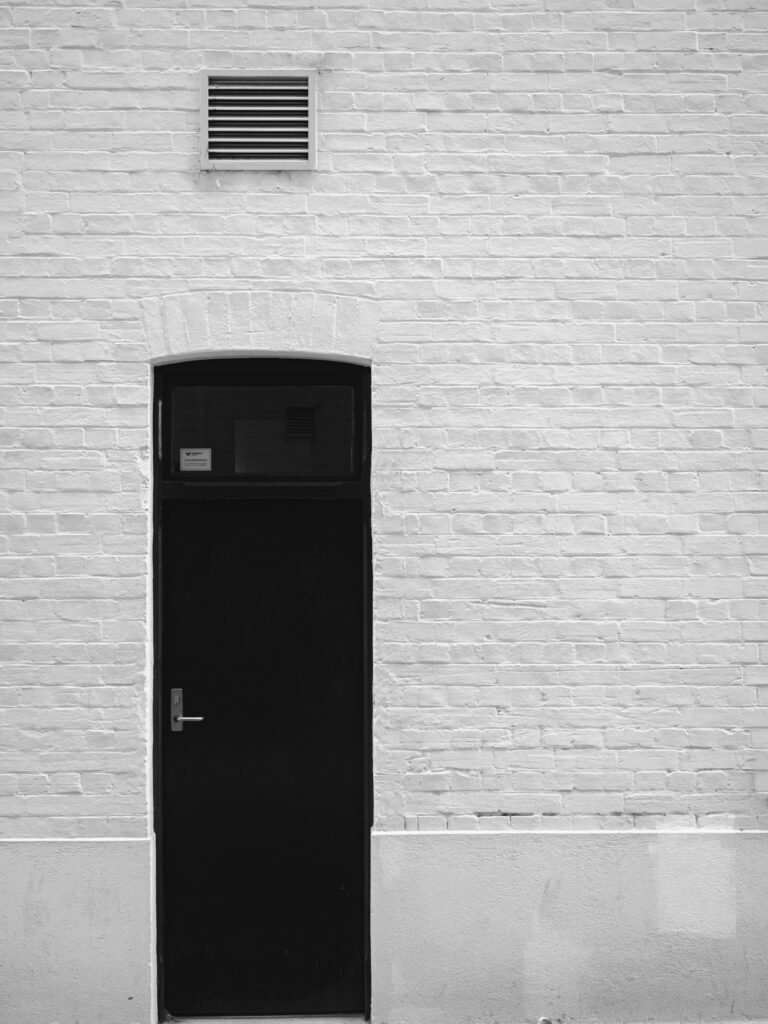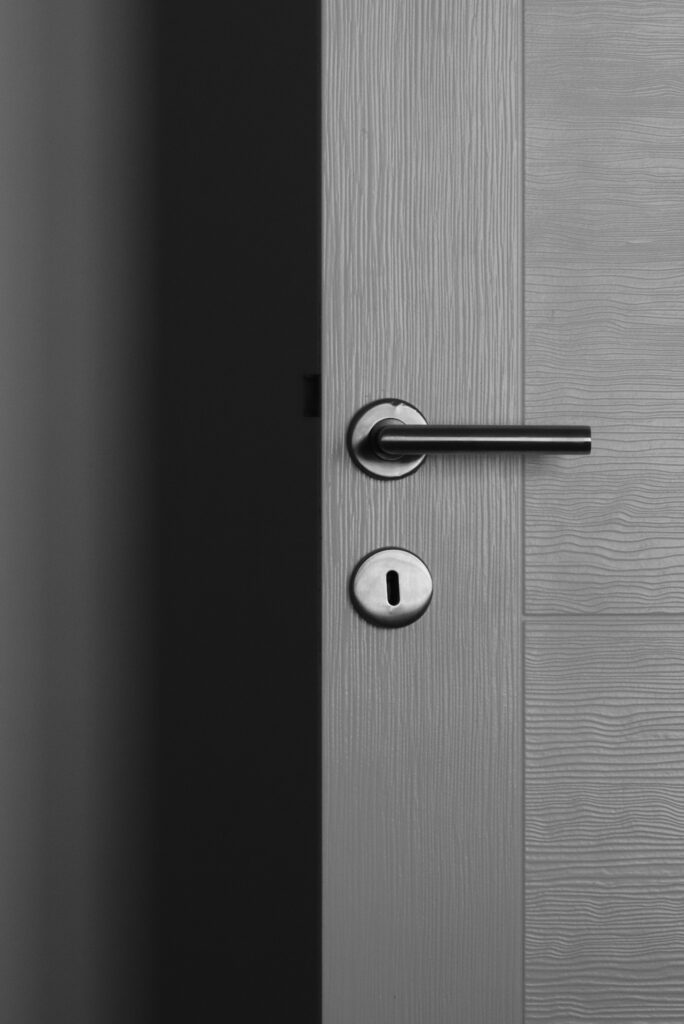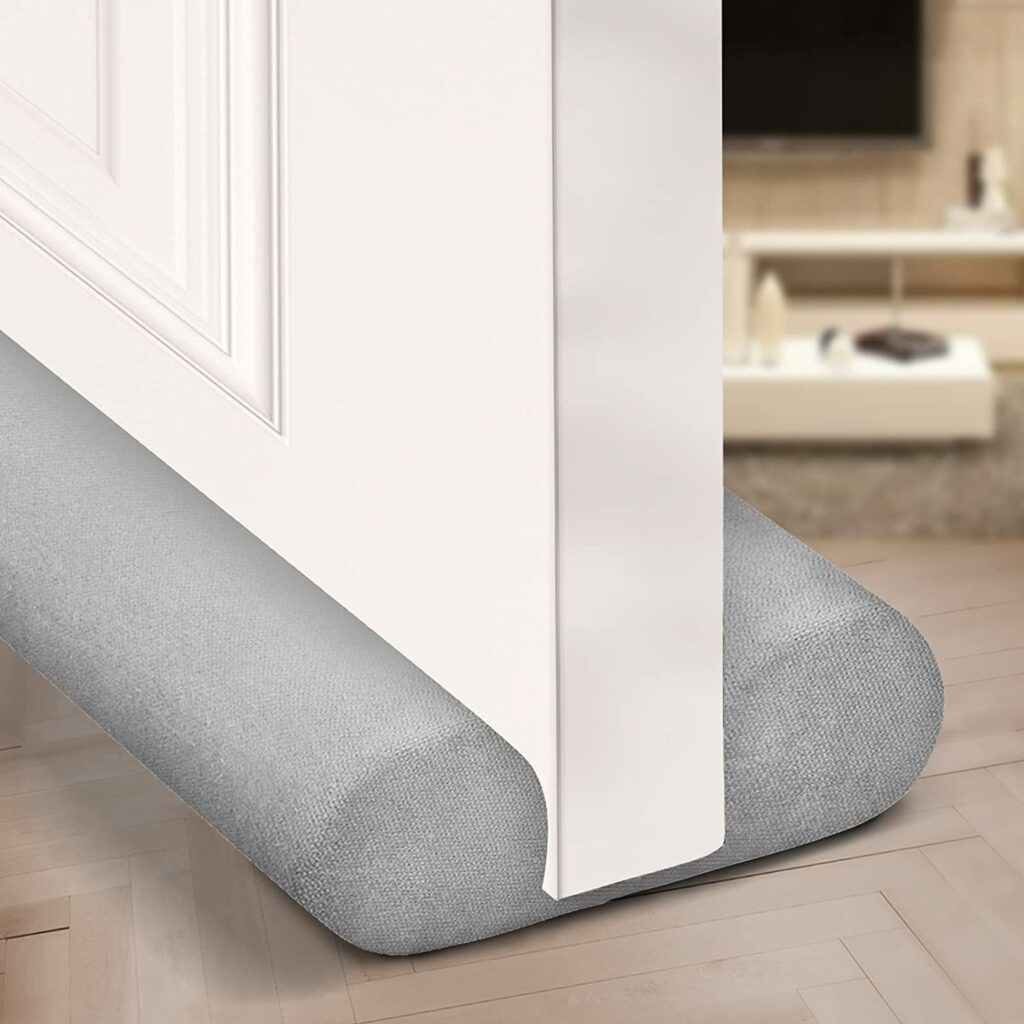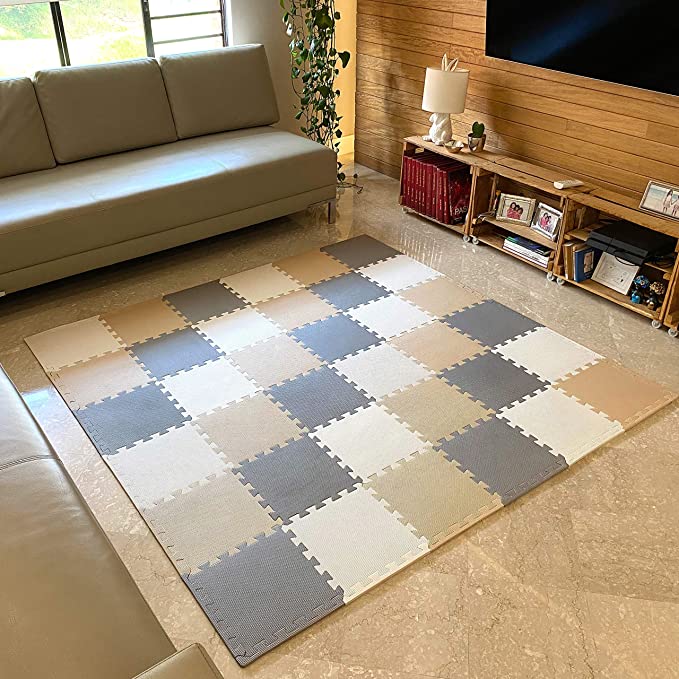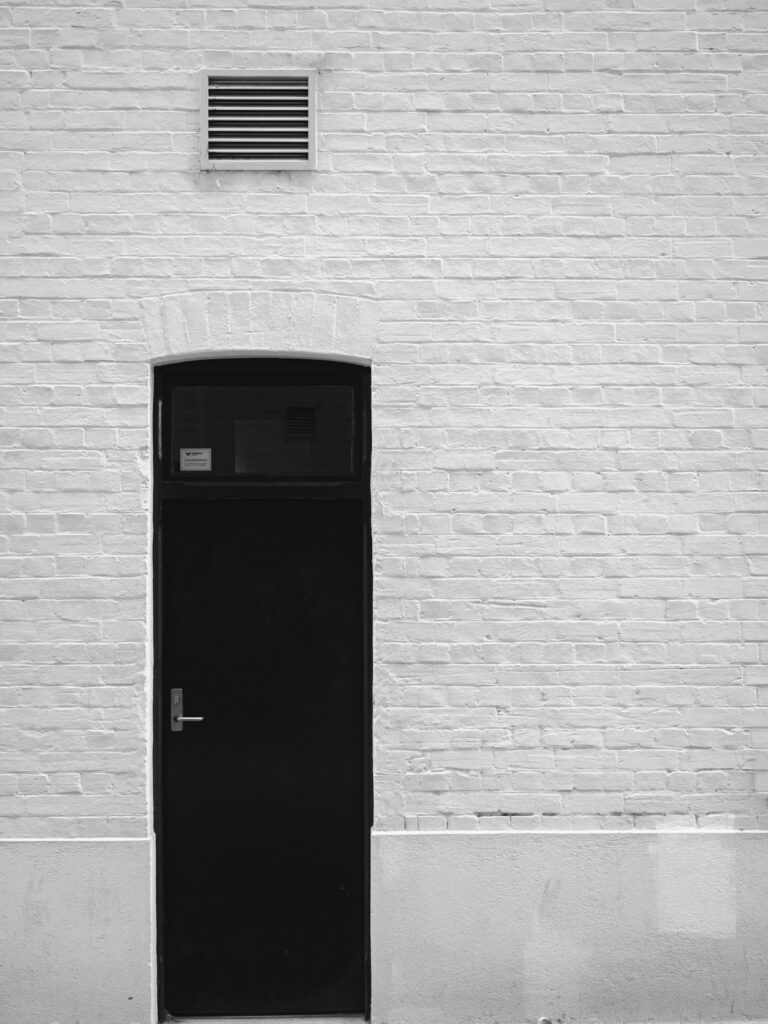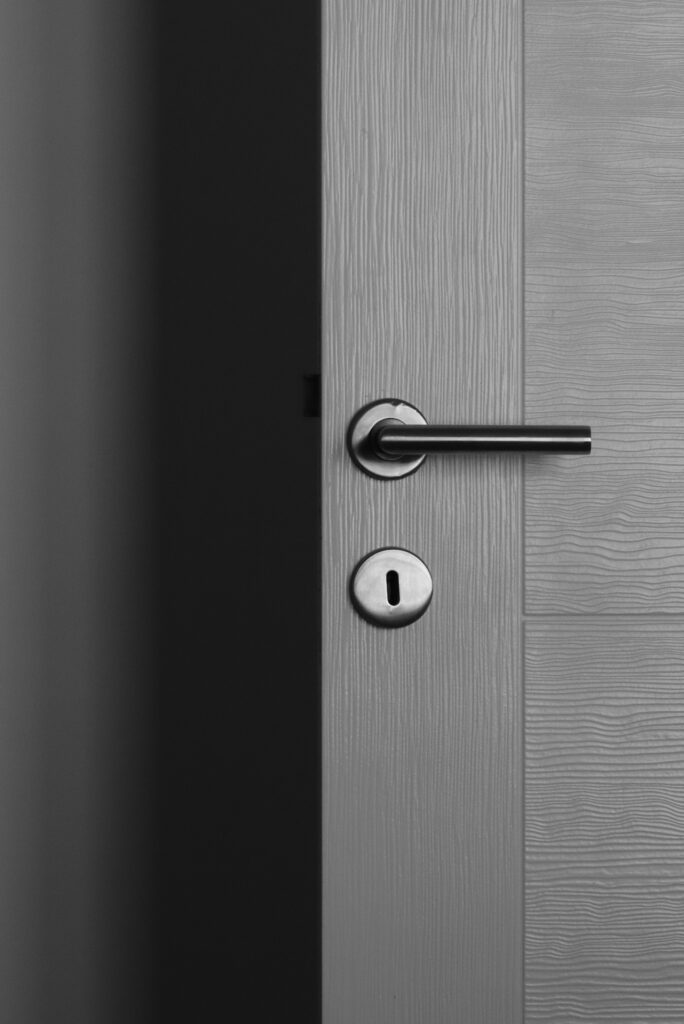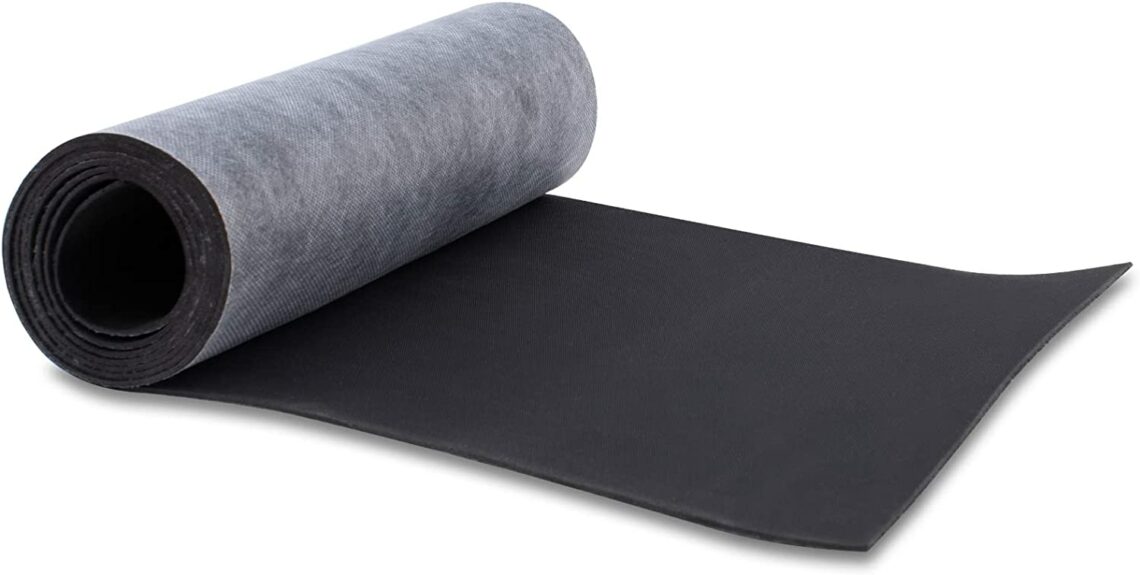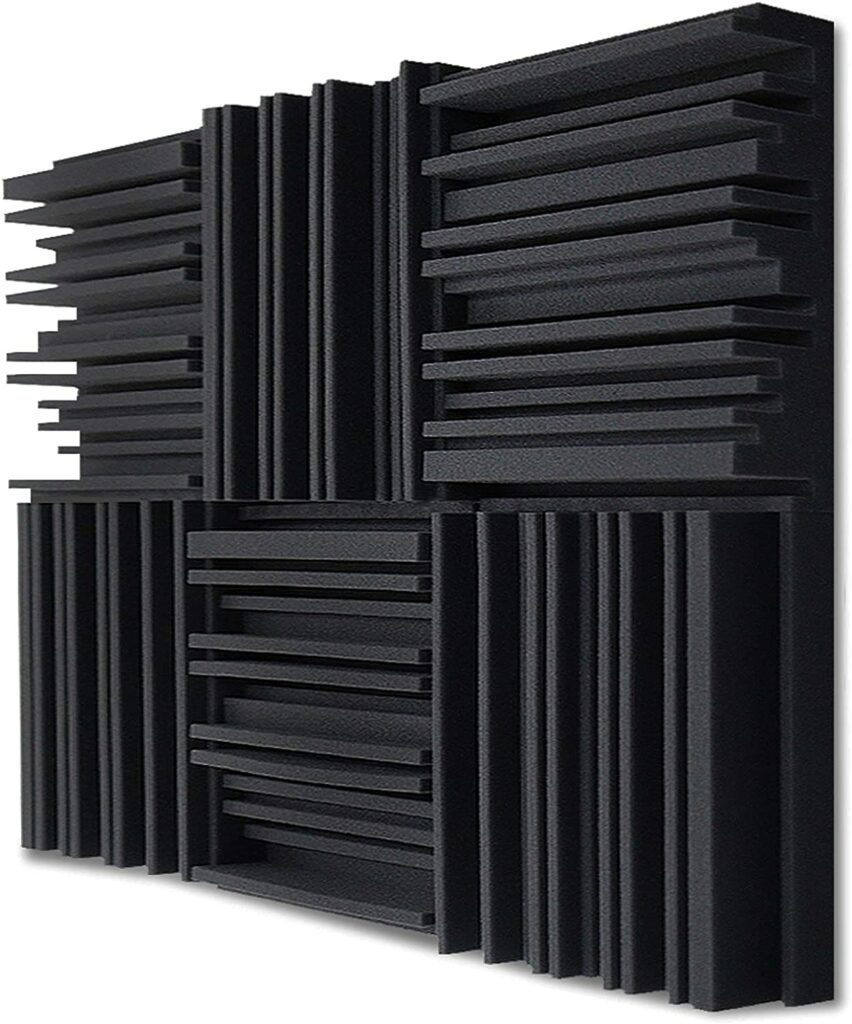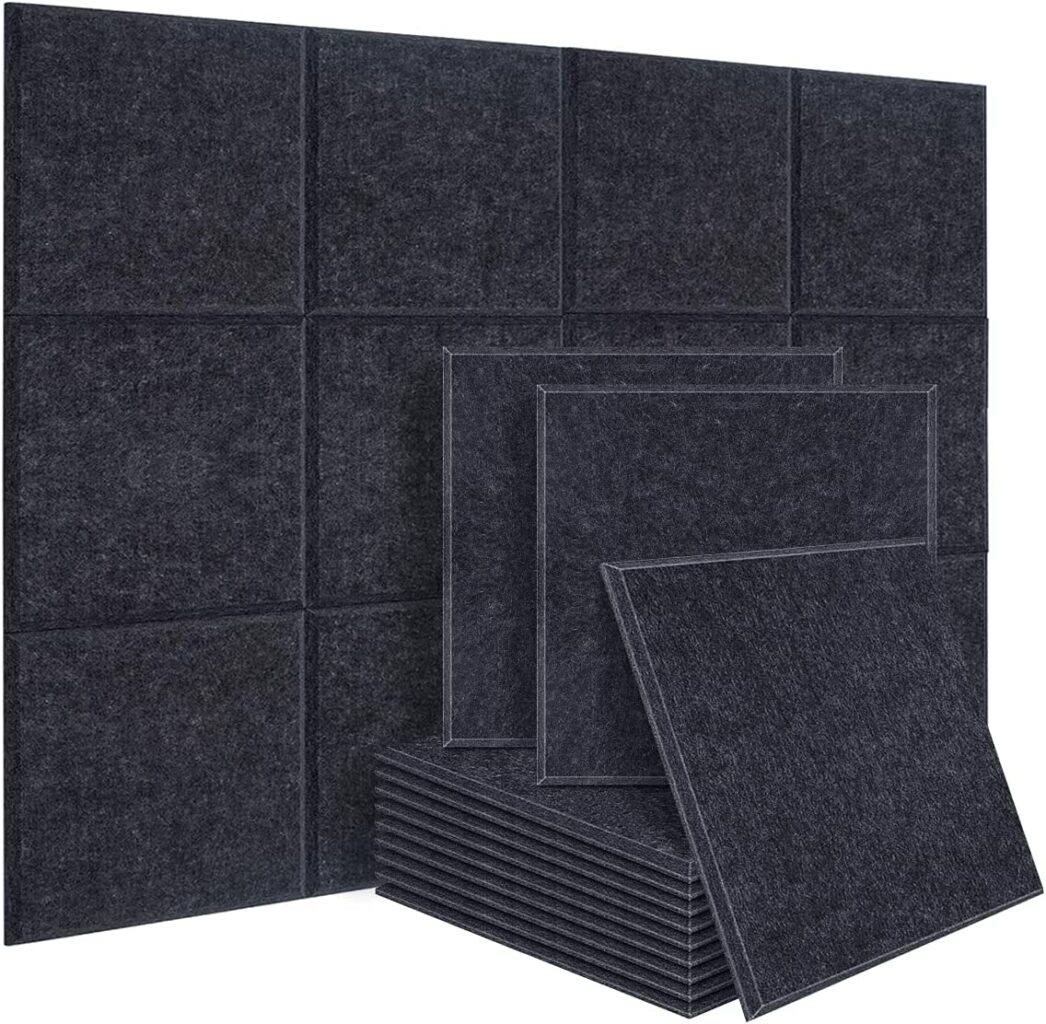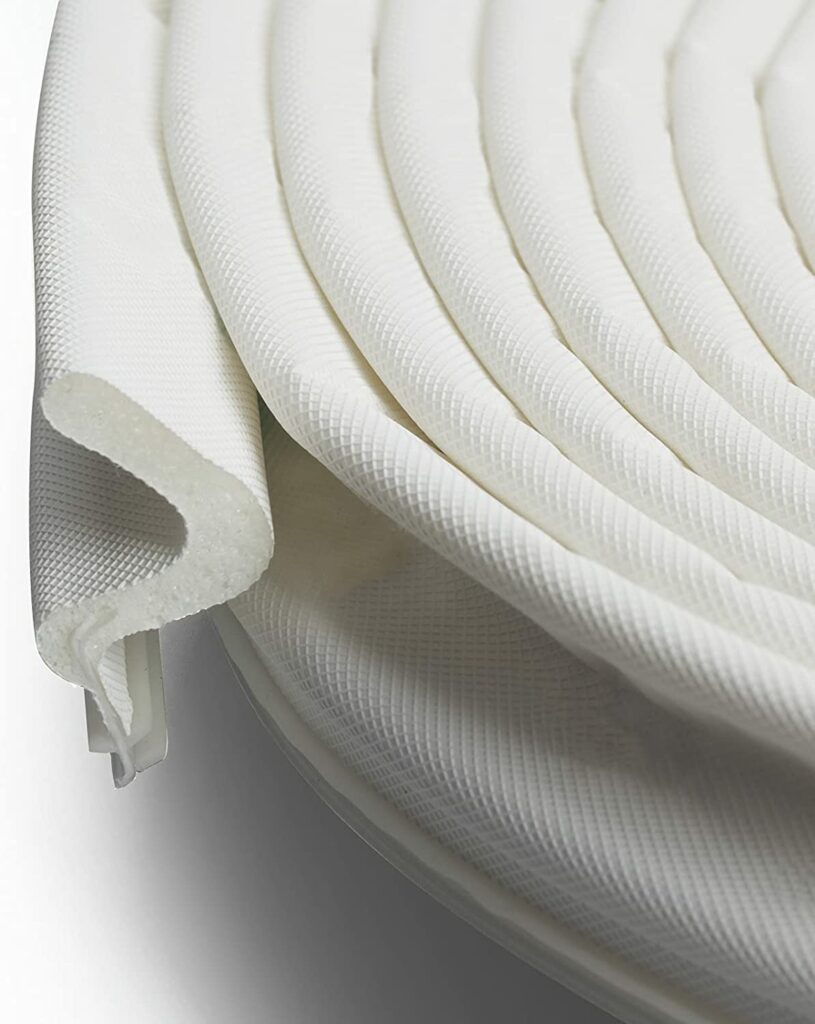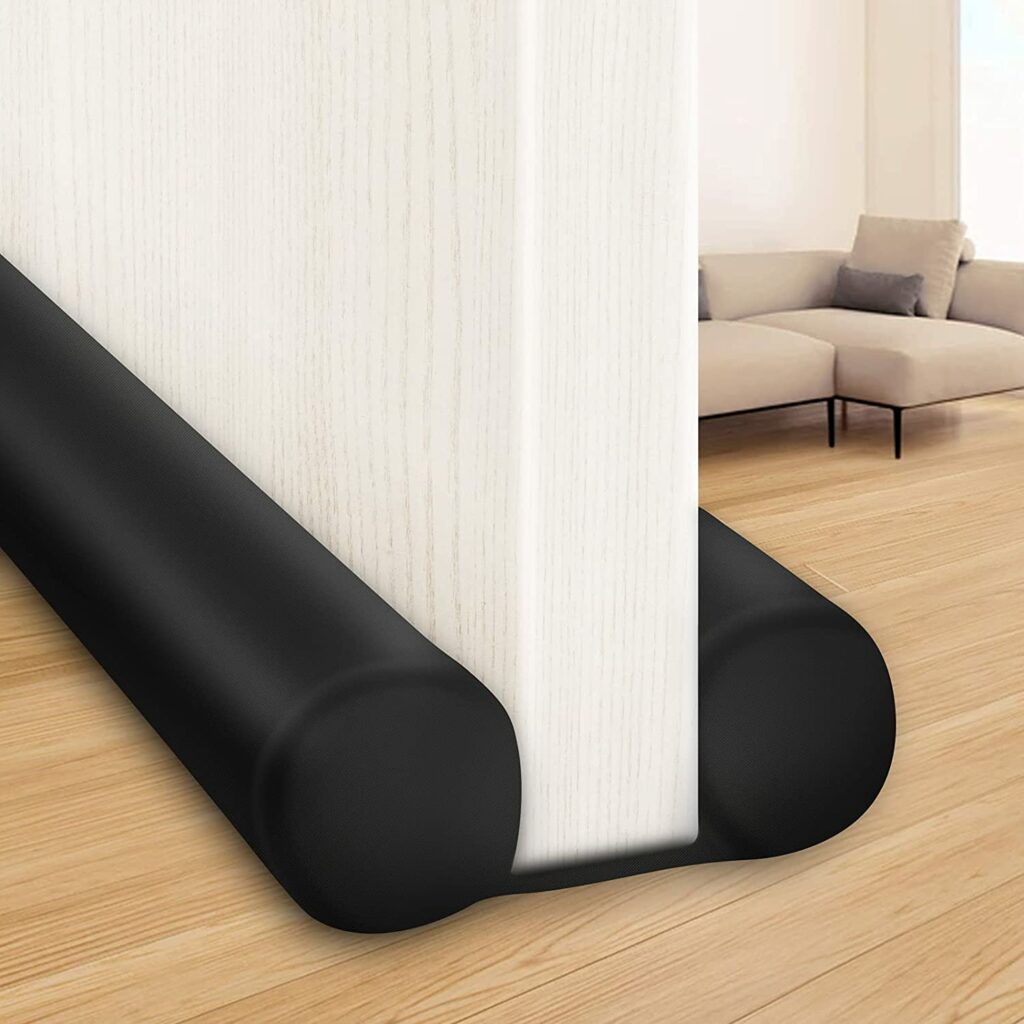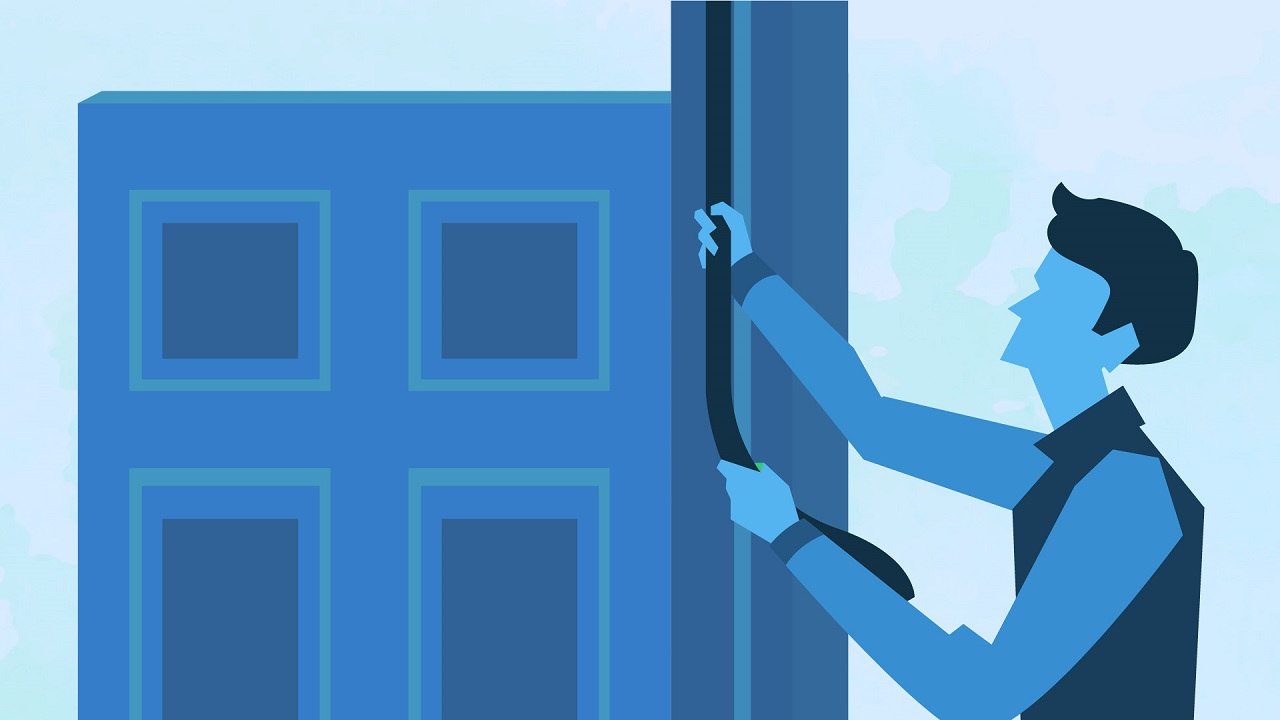To soundproof a door, you need to use materials such as door sweeps, gaskets, and acoustic panels. You can also replace your existing door frame with a thicker, solid-core door as an effective alternative.
Complete sound absorption and sound reduction need a combination of different methods to deal with sound waves effectively.
You must remember that if air gaps exist, sound waves will travel through inside your home, whether in a bedroom, music studio, or bathroom.
Read more to learn the different ways on how to soundproof a door. These methods are convenient and easy to block noise or absorb sound from your surroundings!
How to Soundproof a Door in 12 Different Ways
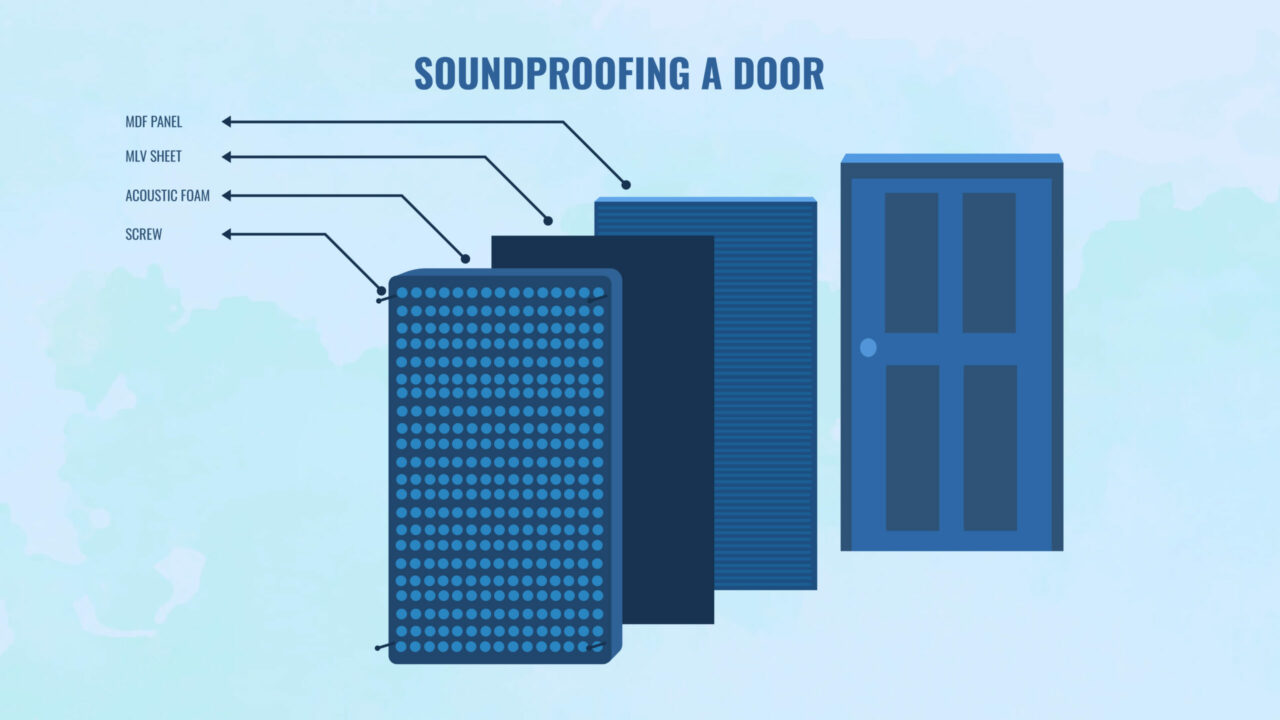
Door soundproofing is crucial if you want a fully soundproofed room because it effectively reduces noise and blocks sound waves.
With this, different materials and methods are used to achieve a soundproofed door successfully:
1. Use Door Gaskets to Seal the Gaps and Cracks
Sounds can travel through small gaps. If you notice any cracks, spaces, or holes around the frame, you should consider using door gaskets.
If you don’t know how to soundproof a door using door gaskets, don’t fret.
Door gaskets are easy to install and effectively block sound waves that may enter the door. You must remove the door frame for a tight seal to install a door gasket.
All you need to do is make sure the gasket is lined up appropriately and close the door frame tightly, so there will be no spaces for the gaps anymore.
Different door gaskets are available on the market, and you must find an affordable door gasket that fits your budget.
A door gasket is an easy soundproofing material you can use!

2. Place a Door Sweep
For effective noise reduction, door sweeps can also be an option! Door sweeps are made of dense materials and natural rubbers.
A door sweep allows you to open and close the door without any resistance to the door frame. These are effective for indoor soundproofing because they block the gaps while also not scratching your floors.
To install a door sweep, you must find the right size that fits your door. If you have a new door, you might need a few screws to lock it tightly.
For the door sweep to have a good soundproofing job, you must ensure it is perfectly lined up. Otherwise, you’ll redo the process again, as the gaps are not tightly filled.
NOTE
A door sweep can help the interior noise in and exterior noise out.
3. Use Gap Foam
Gap foam is an effective alternative to block sound if you have a solid door. Its mass grows and expands, thus creating a barrier for door soundproofing.
Gap foam is also effective if you have a hollow core door because it will block the sound from the outside.
Additionally, it’s considered one of the best soundproofing methods for convenience!
If you want to install gap foam, all you need to do is spray it on the insides of your door. After that, slowly work toward the outsides to cover the gaps.
This is also the best soundproofing method if you have a new door with a hollow core. This is best used as a final coat if you use vinyl sheets, door sweeps, and mass-loaded vinyl.
PRO TIP
The denser the gap foam is, the better and more effective it is.
4. Place a Soundproof Blanket on the Door
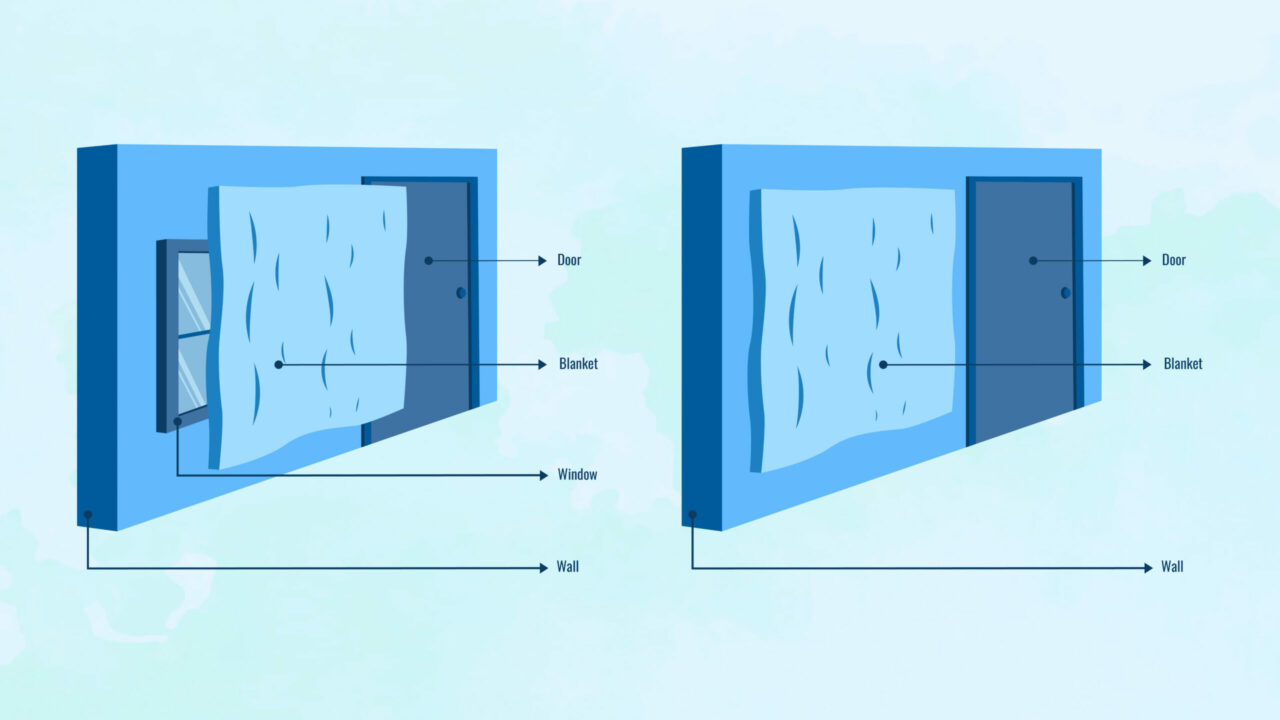
For a practical soundproofing project, a soundproof blanket is a great material you can use!
A thick fiberglass soundproofing blanket can be used on the top of your door if you are trying to keep the sound out.
This is because fiberglass insulates sound from traveling to your room. Many homeowners opt for this in their houses, apartments, and music studios.
TAKE NOTE
Soundproofing blankets will not effectively dampen all sounds unless you also block the gaps below the door and around the door hinges.
If you want to hang a soundproof blanket using velcro, follow the steps below:
- Stick one side to the velcro tape on the entire length of the molding around the door frame.
- Stick the velcro on both sides and the top of the door. Make sure all three sides are perfectly joined together. Also, you won’t need to apply velcro tape on the bottom, but you must put something on the floor since a soundproof blanket won’t give a tight seal at the bottom. A door sweep would be the best soundproofing material for this.
- Do the same process on the soundproof blanket and stick the opposite sides together.
- After sticking the opposite sides, it is time to attach both sides of the velcro. Now, you will have a soundproof blanket with a tight seal!
Using a soundproofing blanket can be one of the most expensive soundproofing methods (depending on what product you buy), but we guarantee that it works well!
5. Use a Solid Core Door
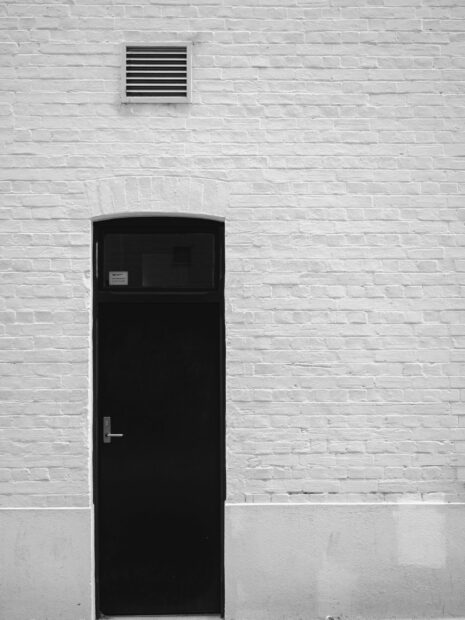
One of the best methods of door soundproofing is utilizing solid-core doors. A solid core door is thick and sturdy, making it an excellent option for preventing noise from entering your room.
If you have a hollow core door, it will create lousy sound insulation since it does not have a heavy enough mass to block sound waves from coming through.
Replacing it with a solid core door can be a serious — but expensive — consideration!
Aside from wooden doors, metal doors are also something to consider. Here are the main differences:
- A wood door can dampen the sound rather than block it. Wood is not perfect for sound protection, but they are a great solution.
- Metal doors are effective for bouncing sound waves in the opposite direction. Metal double doors can be a good soundproofing solution, but some fire codes prevent using metal doors in your homes.
In summary, a solid door made of sturdy wood only dampens the sound, and a metal door with a double seal can reflect the total transfer of the noise.
When it comes to soundproofing a door effectively, choosing the right type of door material is essential, but complementing it with additional soundproofing materials is ideal!
6. Use Sound Insulation Padding Tape
Insulated padding tape is an adhesive type commonly used for wallboard installation. When used to soundproof a door, it effectively reduces noise.
If you have hollow doors, gaps and cracks are usually evident, so sound insulation padding tape will be your best friend to fill the gaps.
Additionally, insulated padding tape is relatively affordable while still being an effective way of preventing sounds from transferring through your walls and door frame gaps.
SIDE NOTE
Padding tape is a good alternative to weather strips and door gaskets.
7. Install a Door Seal Kit
Installing a door seal kit (especially on a solid core door) is another effective door soundproofing solution.
This is also where you can save a lot of money because it is cheaper than other alternatives.
Door seal kits seal the air gaps on any door. Whether you have an old, new, solid-core, or hollow-core door, these kits should work just fine.
But note that if you are planning on sealing gaps and cracks of a hollow-core door, we suggest using a soundproof blanket instead to add more mass to absorb and block sounds.
8. For Interior Doors: Add Soundproofing Rubber to the Door
This soundproofing method will be your go-to solution for any interior door in your house.
Soundproofing rubber is the best solution if you notice extra space, cracks, or gaps on your door.
Soundproofing rubber typically comes in a dense form of neoprene. These materials are genuinely effective for your next soundproofing project.
Below are the steps on how to soundproof a door using soundproofing rubber:
- If your interior door has molding around its door frame, you need to pry it off.
- After prying, add the soundproofing rubber on the edges of your door. This can work on solid doors and hollow doors.
- Add acoustical caulk or an insulating seal to fill the small spaces, cracks, and gaps for a total noise reduction. If you do not know where the small cracks are, turn off the lights and locate where they are coming from.
9. Add Weatherstripping to Your Door
If you use soundproofing rubber on your interior door, you can consider weatherstripping for your front or back exterior door to fill the gaps.
Weatherstripping will insulate doors and windows and protect your house from outside elements!
However, it would be best to remember that weatherstripping tends to degrade over the years, so you must purchase higher and better qualities with a long life expectancy.
Also, if you will use weatherstripping to block sounds, do not forget to apply enough pressure during installation.
This ensures that the weatherstripping is sealed enough to absorb, reduce, and impede sound waves.
10. Use Acoustic Panels on the Door

If you feel like the alternatives above aren’t that effective for door soundproofing, adding an acoustic door panel may be the answer.
An acoustic soundproof panel offers a significant step if you have an interior and solid core door. It works as a glue that binds the sheet of plywood to your door.
These methods are not as expensive and high-end as fiberglass blankets, but they still offer effective soundproofing!
Acoustic panels come in different forms, such as spray foam and solid wood. These are commonly used in most doors so that sound waves cannot pass through them.
The best way to use acoustic panels is to nail them on your new door. But to avoid damaging the door, you can use adhesive strips.
11. Add Door Thresholds
Adding door thresholds is one of the overlooked ways to soundproof a door.
Door thresholds are made of neoprene with rubber protrusions that help fill the gaps at the bottom of a closed door.
Unlike a door sweep, a door threshold is attached to the floor of the doorway rather than to the bottom of the door.
However, if you have a carpeted floor, you might encounter various problems with a door threshold and a door sweep combo.
A door threshold and sweep will NOT perfectly seal a door on carpeted flooring.
12. For Metal Doors: Use a Mass Loaded Vinyl
If you have a metal door, mass-loaded vinyl is the best go-to solution!
You can buy mass vinyl sheets at your local department stores, and we guarantee these materials are affordable.
To use it, you just need to stick it to your door using adhesive strips.
What’s also great about mass-loaded vinyl is that it’s easily replaceable.
Why Should You Soundproof Your Door? [5 Benefits]
Some might wonder why getting a soundproof door is so important.
Well, the answer is simple: unwanted sounds and noise leaking through your house can be highly irritating.
A soundproofed room offers comfort, especially after a long tiring day!
Below are the reasons why you should soundproof your door:
1. Sound Waves Can Travel Through Gaps
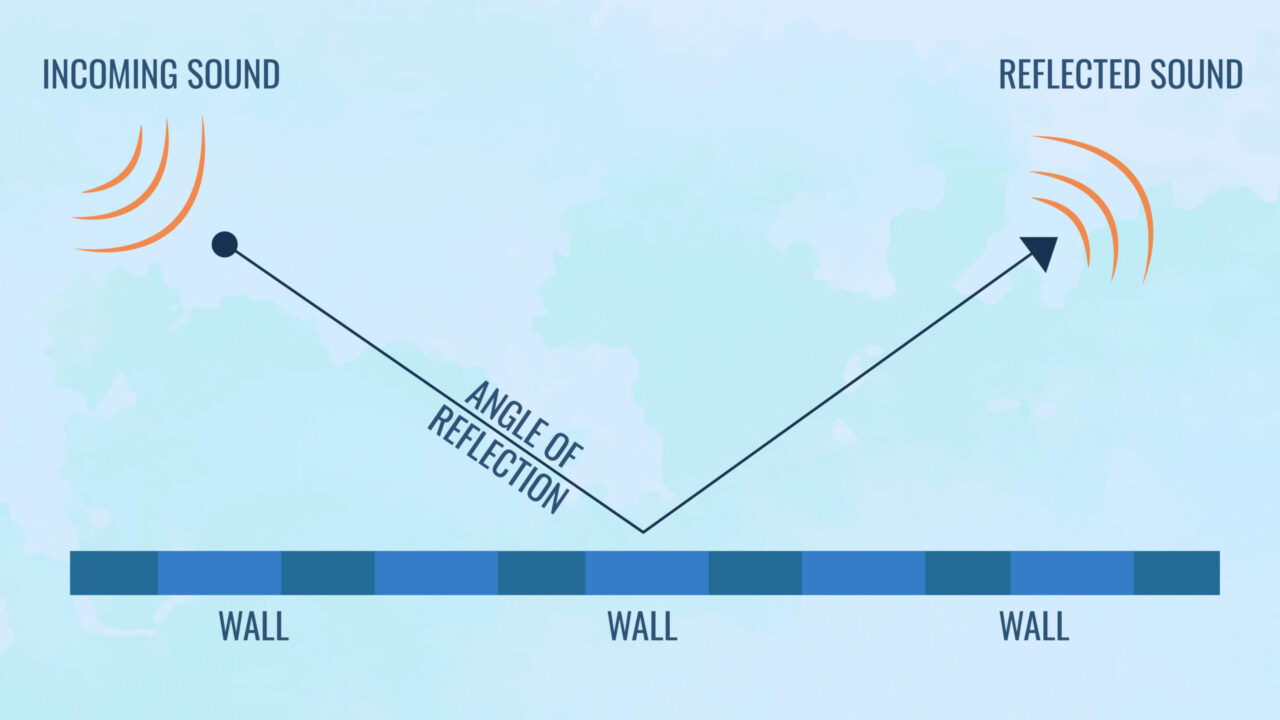
There is no doubt that noise and sounds can travel through the gaps, especially if you have garage doors.
Most ordinary doors have a space at the bottom of the floor. When a gap is present, it leads to sound leaks.
Additionally, most interior doors have a hollow core. Most homeowners opt for these cost-effective doors, not knowing about their ineffectiveness in blocking sound.
Also, if you have a hollow core door, it can transmit more noise than walls and floor combined.
Thus, to prevent noise, you must have a soundproof door, preferably a solid core door with additional soundproof materials.
Most of the sound will not pass through your room, and the question of “how much noise will transfer” will depend on your soundproofing efforts!
2. Security and Privacy Purposes
If you don’t want your neighbors to hear what’s going on inside your home, a soundproof door is a MUST.
Soundproof doors ensure that nobody will hear what’s happening inside, so eavesdropping will not be a problem.
It effectively reduces sound transfer because there will be no holes or gaps for the sound to travel. Hence, soundproof doors are essential if you want security and privacy!
3. Can Induce Better Room Temperature
Soundproofing a door is not just limited to impeding the transfer of noise. It can also work by offering an additional benefit: temperature insulation.
Other than absorbing sound, soundproof doors improve the air quality and humidity and increase your room’s comfort level.
Hence, if you have a soundproof door, you will have a soundproof room with less heat.
A soundproof room also helps keep out any pollutants and moisture, so you will have a more comfortable room to work and relax in.
4. Increase the Value of Your Home

If you are looking for a way to increase the value of your home, having soundproof doors is a great plus!
In the modern day, most home buyers in the United States are looking for a more comfortable home with a high ceiling, a spacious feel, and an already-soundproofed room.
So if you’re looking to earn some big bucks when you sell your house, having a soundproof room with soundproof doors is a great asset.
5. Essential for Various Situations
You might need to soundproof a door if you’re in the following situations:
Work From Home
A soundproof door will be your best friend if you work remotely!
To focus on your work, a soundproof door will effectively absorb sound waves that might distract you. This is especially true if your work revolves around writing, recording, and creating videos.
It does a fantastic job because it will prevent noise from entering the premises of your room, allowing you to shut down the outside world’s distractions and focus on what you need to do.
Noisy Neighbors
Having a loud neighbor is one of the common distractions in any neighborhood.
With this, if you want to prevent hearing your noisy neighbors, door soundproofing is one of the best techniques!
Solid core doors effectively give you much-needed quiet time to finish your tasks.
If You Are Playing Noisy Instrument
If YOU are the noisy neighbor, you need to consider your neighbors’ feelings.
You can’t just play a loud instrument, blast music at the highest volume, and use the TV loudly like you don’t care!
By soundproofing your home, you can enjoy the comfort of music, rehearse, or have fun with your instrument WITHOUT disturbing your neighbor.
That way, you and your neighbor can enjoy peace without concerning one another.
Additional Tips for Successful Door Soundproofing
If you need more help in applying the methods above, these additional tips will surely be useful!
We guarantee these top tips will help you effectively block sounds that may pass through your doors:
1. Block the Door Holes and Cracks
Sound travels through holes and cracks in your door. Also, if you have an old door model that has not been maintained over the years, it may cause even more noise.
With this, you need to find the cause of noise leakage. Use a spray foam, a door sweep, and a door gasket if it is because of the cracks and holes.
Take care of everything, from the door sill, door jambs, and door head!
All you need to do is ensure that your material is properly closed and sealed. Otherwise, the noise will still pass through the gaps.
But, if your old door model is the reason, installing a new solid-core door is the best alternative.
2. Block the Surface of Your Door
To soundproof a door, you just need to block the surfaces. A great method for this is to place acoustic drapes over the door.
If you are interested in using this method, follow the steps below:
- Install a short curtain rod over the back of your door.
- Get a heavy fabric drape and hang it on the rod.
- Slide the drape into place for less noise coming from outside.
This method is best for renters who cannot have significant alterations on the door jamb.
After installing the acoustic drapes, you should test opening and closing where the doors meet to see if they affect how the door functions.
3. Coat the Door With Sound-Absorbing Paint
If you’re looking for an affordable method to soundproof a door, coating it with a sound-absorbing pain is a viable option.
Go to your local hardware store and ask for the best affordable yet high-quality sound-absorbing interior paints.
Choose a paint color that matches the color of your existing door. However, you can use a contrasting shade to have a playful theme.
After choosing a color, follow the direction on the container on how to apply it. Sound-absorbing paint is quite similar to ordinary paint but has a thick consistency.
All you need to do is remove the door jamb and hinges and paint it with many coats to block the noise.
IMPORTANT NOTE
Sound-absorbing paint can somewhat help keep the noise from inside the room traveling outside, but it won’t be enough as a complete soundproofing solution. Be sure to combine it with other methods!
4. Install Foam Tiles

To soundproof a door, acoustic foam tiles are also great! Depending on the model of your tile, you’ll need to attach them to your door using glue, screws, or staples.
Ensure that the acoustic foam tiles are placed securely. Otherwise, they might fall off with the door’s movement.
Additionally, acoustic tiles come in different noise-reduction levels, so choose the highest and best quality for adequate sound protection.
A rubber flooring tile is the best alternative if acoustic foam tiles are unavailable. These are cheaper and easier to find, and they will bring decent noise reduction.
5. Start Small and Build Up
To soundproof a door, you might need a LOT of money because of all the materials you need.
Buying a door sweep, door gasket, and other soundproofing kits can be pretty expensive all-in-all.
The best tip we can give you is to start small and see what method works. As we have different preferences, some may be satisfied with minimal effort in soundproofing a door.
On the other hand, others might want a total makeover to soundproof a door. If you want a total noise blackout, spending more money and hoping for an improvement will not hurt.
6. Identify the Cause of Noise
One of the best tips to soundproof a door is to identify where the noise leakage comes from!
Some have problems with the noises coming from the outside, so they need other methods.
For example, if your noisy neighbors cause the noise, hanging soundproof blankets could be a good option for you.
When made with high-quality materials, soundproof blankets will work if used correctly. Depending on the size and weight of your soundproof blankets, they can reduce the noise of a room significantly.
On the other hand, you can use a door sweep and a soundproofing kit to reduce the noise inside your home.
Legal Requirements to Consider Before Soundproofing a Door
Before soundproofing a door, you must consider the legal state requirements, if there are any.
With this, let’s look at some of the possible legal barriers you might need to know before starting your soundproofing project:
Rental Soundproofing
If you have your own house, you obviously don’t have to worry about this. However, those renting a home, storage unit, garage, and apartment, need to consider this thoroughly.
Your landlord might not favor altering the apartment you rent into a soundproofing room. This means all kinds of soundproofing materials are prohibited.
Make sure you ask permission from your landlord! Severe fines will be imposed if you damage any rental agreement, which might get you evicted.
Most landlords do not have a problem with non-permanent soundproofing solutions, such as attaching door sweeps and hanging soundproofing blankets.
Our best advice
Stick with the simpler and easily-removable solutions. Don’t drill or break a closed door until you have approval!
Fire Codes
Everyone should know about fire codes and regulations, regardless of their rental or ownership status.
Cities, counties, and states have different rules and regulations about what is and isn’t allowed.
This is because soundproofing could violate fire codes. After all, some methods can make the door heavier, which could prevent someone from escaping a room when on fire.
Also, another reason why it could violate fire codes is that it can stop fire and carbon dioxide detectors from working correctly.
Some materials you use might also be highly-flammable!
Thus, before opting for a soundproof door, review your state’s fire code to avoid violating the rules and regulations.
Misconceptions About Soundproofing Doors
We are sure you’ve done all the methods to improvise a soundproof door. Whether the noise leakage is coming from your neighbors or your family, there are dozens of solutions!
However, there are some methods of door soundproofing that do not completely work. Some of these methods are used to absorb sound, but they do not block the sound entirely.
With that, below are a handful of myths about door soundproofing:
1. Paints and Glues Are Effective in Cutting Sounds
Sound blocking requires a heavy mass and density, and there’s no scientific explanation that paints and glues can cut sounds.
Therefore, regular paints and glues DO NOT have a noticeable effect in reducing sound.
These materials shouldn’t be used as the main solution for blocking noise.
A combination of a soundproofing kit, door sweep, and solid core doors must be utilized in soundproofing a door effectively.
You can still use thicker, soundproof paint to help, but you need to remember that even THAT isn’t enough to completely block the sound coming from your surroundings.
2. Rugs Limit Noise
Rugs indeed limit noise by a small amount. But if you want total noise reduction, rugs are not practical!
This is a common mistake of every homeowner because they believe that thick rugs can reduce the noise from outside.
Unfortunately, a rug can dampen the noise only ever so slightly.
3. Ordinary Blankets, Cardboard, and Foam Blocks, Can Reduce Noise Leakage
Regular blankets, cardboard, etc., can somewhat dampen sound from coming in or out.
But if you want a peaceful room where you cannot hear a noise from the outside, these are ineffective.
This is because the materials used are TOO THIN. As a general rule of thumb, a heavy mass is needed when soundproofing a door effectively.
4. Curtains Can Be Used in Soundproofing a Door
Curtains lack density and mass (unless they’re thick, soundproof curtains), so it is NOT the appropriate material for soundproofing.
However, these are acceptable options if you only want the noise reduced by a small decibel!
If you want to have a total noise blackout, we suggest installing a door sweep, a soundproof blanket, a solid-core door, or using a door soundproofing kit.
5. Adding More Layers of Drywall Will Help to Block Noise
Adding more layers of drywall can only reduce the noise by so much. This method is not practical in totally blocking out the noise leakage.
A much better solution for effective noise reduction is to use mass-loaded vinyl. All you need to do is integrate it between your drywall.
However, you might need to tear down your walls to be able to insert the MLV.
But rest assured that doing this is much more effective in blocking sounds than relying on multiple layers of drywall!

FAQs
Below are the commonly asked questions about door soundproofing that might still be lingering in your mind:
Should I Soundproof My Door or Buy a New Solid Core Door?
If you want an affordable method for door soundproofing, you can use door sweeps and soundproof blankets.
However, this method can still allow some noise through your room. If you want a more effective noise-blocking solution, we suggest buying a new solid-core door.
A solid core door is a high-quality, durable material that insulates sound and heat effectively. But remember, you still need to supplement it with other soundproofing solutions.
How Can I Soundproof a Hollow Door?
ou can soundproof your hollow door in different ways, and these are:
Use soundproof blankets
Add mass to your door
Install a door sweep
Use a soundproof curtain
The methods above will help you have the comfort you’ve been wanting.
How Much Does a Soundproof Door Cost?
Soundproof doors (or solid core doors) are pretty expensive. They can range between $100 to $400.
This price is limited to the door itself, where delivery and installation expenses are not covered.
Thus, if you want a soundproof door, you must prepare a large sum of money to avoid difficulties.
If you’re asking about how much it will cost to soundproof a door, it will depend on what soundproofing materials you will buy and use.
This can cost you as low as less than $5 to as much as $100+.
What Type of Door Material is Best for Soundproofing?
Hardwood is the best door material to use for soundproofing. However, these can be extremely expensive.
If you want cost-effective options, steel and fiberglass are great alternatives! Steel and fiberglass can provide the same level of noise-blocking performance.
Where Can I Buy Soundproofing Materials?
You can purchase soundproofing materials at your local hardware store. They have all the necessary materials, from a door sweep to blankets and more.
However, remember to purchase what fits your budget. Plan accordingly!
Conclusion
A soundproof door is a great way to block sound from the outside. It helps you have the peace and comfort you need after a long tiring day.
Additionally, door soundproofing offers more security because your neighbors cannot hear what’s going on inside your home and vice versa.
Door soundproofing also helps improve the air quality, humidity, and comfort in your comfort.
Thus, a soundproof door is a vital part of your home for utmost relaxation!



